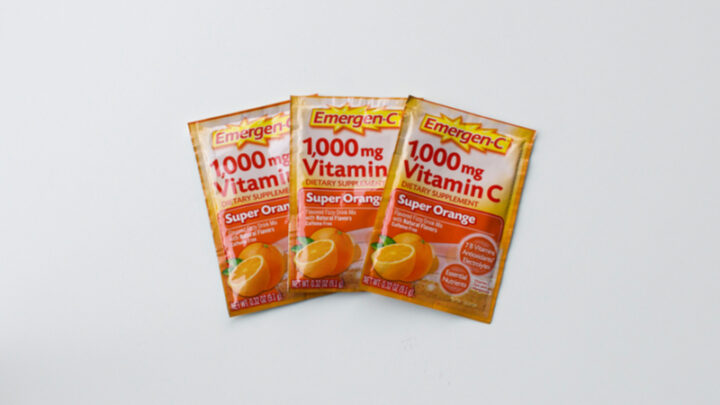Many breastfeeding moms wonder if the many benefits of this supplement can make their lives easier.
The reality is, it’s quite tempting to use something you’ve used before while breastfeeding.
However, lactating moms shouldn’t just take supplements or foods without first consulting their doctor to check whether or not it may harm their baby.
Today, we’re going to discuss whether the Emergen-C supplement is safe to use and if it satisfies recommended dietary allowance.
We’ll also talk about what vitamins form part of this supplement, like Vitamin C and Vitamin B12.
Breastfeeding moms can eat anything as long as it doesn’t upset the baby’s stomach. However, many moms are still unsure about their breastmilk and its quality.
They have serious anxiety and feel the need to take additional multivitamins just to be sure their babies are consuming high-quality milk.
But, can I let you in on a little secret? All breast milk is good milk.
There’s no such thing as poor or thin milk.
Every mother produces what’s best for her baby.
So, how does Emergen-C react through breast milk and can lactating moms use it to boost their immune system?
Before hopping onto Amazon to buy this supplement, you should do thorough research.
I’m here to share the results of my search through articles so that we can determine whether or not it’s safe to use Emergen-C while breastfeeding.
What Is Emergen-C?
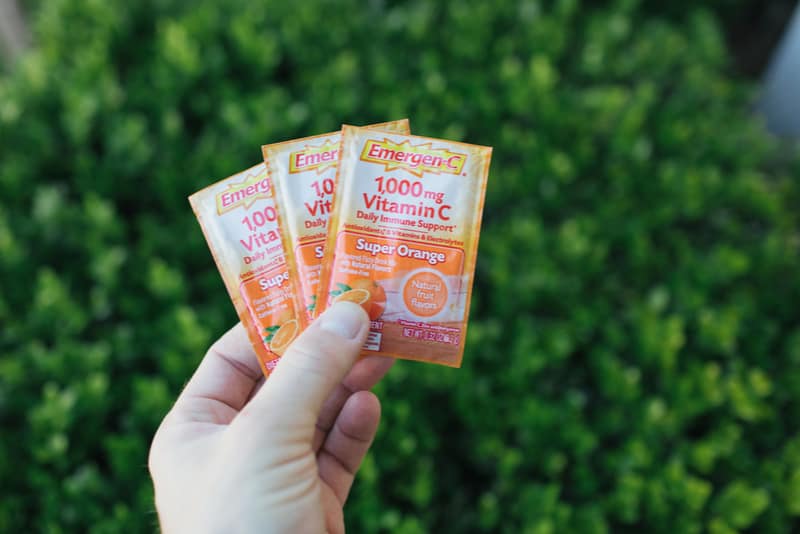
Emergen-C is a dietary supplement that’s used to boost the immune system. This brand has numerous products in a variety of flavors.
Here are the most common Emergen-C products that people buy:
– Emergen-C Everyday Immune Support
– Emergen-C Immune plus
– Emergen-C Energy plus
– Emergen-C Botanicals
– Emergen-C Probiotics Plus
– Emergen-C Hydration Plus
– Emergen-Zzzz, for sleep and relaxation
– Emergen-C Kids
The Emergen-C products come in several different forms such as gummies, chewables, shots, and effervescent powder.
In addition, they come in a ton of flavors such as orange, coconut-pineapple, raspberry, lemon-lime, acai berry, and more for the ultimate flavor.
But, today we’re going to discuss their most used product, the Emergen-C Everyday Immune Support which, according to the brand, contains 1000 mg Vitamin-C which is more than 10 oranges worth.
This is an amazing claim, but seriously, who would eat so many oranges in one day?
This product will give your immune system a boost and produce the additional energy that you need to function normally.
Emergen-C Contents & RDA
Emergen C offers daily immune support with a delicious orange flavor.
You can use Emergen C while breastfeeding, but you shouldn’t go past the recommended daily amount.
Each package of Emergen C has a detailed list of the nutrients present in one package or in one serving.
Before consuming Emergen C, have a look at the table below. It provides information on the amount of nutrients in one serving of Emergen C, the RDA recommended dietary allowance during lactation per day, and the nutrient’s upper intake limit.
| Nutrient | Amount per serving | RDA per day | Upper intake limit |
|---|---|---|---|
| Vitamin | C1000 mg | 120 mg | 2000 mg |
| Thiamin (Vitamin B1) | 0.36 mg | 1.4 mg | ND |
| Riboflavin (Vitamin B2) | 0.39 mg | 1.6 mg | 27 mg |
| Niacin (Vitamin B3 | 4 mg | 35 mg | 35 mg |
| Vitamin B6 | 10 mg | 2.0 mg | 100 mg |
| Folate (Vitamin B9) | 167 mcg | 500 mcg | 1000 mcg |
| Vitamin B12 | 25 mcg | 2.8 mcg | 500-1000 mcg |
| Pantothenic acid | 2.5 mg | 7 mg | ND |
| Calcium | 50 mg | 1300 mg | 2500 mg |
| Phosphorous | 38 mg | 700 mg | 4000 mg |
| Magnesium | 53 mg | 310 mg | 350 mg |
| Zinc | 2 mg | 12 mg | 40 mg |
| Manganese | 0.5 mg | 2.6 mg | 11 mg |
| Chromium | 10 mcg | 45 mcg | 1000 mcg |
| Sodium | 65 mg | 1500 mg | ND |
| Potassium | 200 mg | 2800 mg | ND |
The original formula of Emergen-C consists of the above.
The main ingredient of Emergen-C is Vitamin C, with 1000 mg in one serving which is more than the recommended daily amount of only 120mg.
However, you can easily take higher doses of Vitamin C up to 2000 mg.
Researchers have proven that high doses of vitamins won’t harm your baby if you’re a breastfeeding mother and it won’t hurt you either.
Other nutrients found in Emergen-C, such as Vitamin-B12, are below the upper intake limit.
Why Is Vitamin C So Important?

Vitamin C or ascorbic acid is a water-soluble vitamin a human’s body cannot synthesize.
We need to get it from external sources such as foods rich in Vitamin C or take dietary supplements.
Our bodies need Vitamin C to function normally. Did you know this vitamin is responsible for the following processes in our bodies?
– Protein metabolism
– Helps with wound healing
– Acts like a psychological antioxidant
– Improves iron absorption
– Boosts immune function
What Happens If You Lack Vitamin C?
If you lack Vitamin C, it may lead to many health issues, including scurvy.
The signs and symptoms of a Vitamin C deficiency can appear within a month of minimal or absolute lack of Vitamin C and the disease is characterized by:
– Fatigue or lassitude
– Inflammation of gums
– Bleeding gums
– Loosening or loss of teeth
– Weakness of the connective tissues
– Capillary fragility
– Joint pain
– Poor wound healing
– Anemia
– Bone disease
– Depression
– Death
I’m sure that you now know just how important Vitamin C is for our bodies!
Can You Take Emergen-C While Breastfeeding?
This Vitamin C supplement should be taken as advised by your doctor. If you feel as though you could benefit from this supplement, then consult your doctor. He’ll prescribe you Vitamin C supplements like Emergen-C and advise you about where to find Vitamin C in foods.
How Important Is Vitamin C For Babies?

For the first six months of their lives, babies depend on their mothers for vital nutrients.
They receive them all through breastmilk, including Vitamin C. At this point, I’m pretty sure that you already know what a breastfeeding mom can and cannot eat.
Babies need Vitamin C as it plays a major role in skeletal development.
If your baby lacks Vitamin C, it may lead to impaired bone growth and other bone-related diseases
Vitamin C also helps to heal wounds, helps your skin look better, prevents infections, helps with iron absorption, and fights against diseases like cardiovascular conditions and cancers.
It’s proven that Vitamin C reduces the risk of atopy and allergies in babies.
Lactating moms that lack Vitamin C may transfer this deficiency to their babies and make them prone to atopy, asthma, or eczema.
Does The Vitamin-C Consumed By Mom Affect The Amount Of Vitamin C In Breastmilk?
The amount of Vitamin C in breast milk depends on a mother’s intake of this vitamin through food or supplements.
As the mother increases Vitamin C intake, the amount of this vitamin in breast milk will also increase.
If a breastfeeding mom includes a Vitamin C supplement in her daily diet, the Vitamin C supplement will not significantly affect the amount in the breastmilk.
But, if a mom lacks Vitamin C, the amount of Vitamin C content in her breast milk will increase after taking the supplementation. In some cases, the milk supply will also increase.
Is Too Much Vitamin C Bad?
You’d really need to take a bunch of Vitamin C to exceed the upper intake limit. Occasional over-consumption is okay as this is a water-soluble vitamin. Any extra vitamins will be excreted via urine.
However rare it may be, it’s still possible and too much Vitamin C can lead to:
– Diarrhea
– Queasiness
– Puking/ acid reflux
– Indigestion
– Stomach pain
– Headache
– Sleeplessness
– Kidney stones
– Iron overload which can be harmful to the heart, thyroid, liver, pancreas, and CNS.
The symptoms listed above will occur if you take high doses of Vitamin C or 3000 mg a day in the form of supplements.
Natural Food Sources Of Vitamin-C

Fruits and veggies are the best sources of Vitamin C.
Fruits like oranges and grapefruits, and potatoes and tomatoes are great primary Vitamin C sources.
These are everyday items, but what are some of the other, less common ones in our diet?
Did you know that red and bell peppers, broccoli, Brussel sprouts, cantaloupe, and strawberries are packed with Vitamin C?
This vitamin is also present in fortified breakfast cereals.
Vitamin C content in foods does get affected by storage and cooking.
Heat destroys tons of it, but steaming and baking will preserve much of the Vitamin C content.
The good news is that foods rich in Vitamin C are usually preserved raw.
Besides Vitamin C, Emergen-C has a high Vitamin B12 count which is significant for our diet.
Let’s discuss this vitamin.
What Is Vitamin-B12?
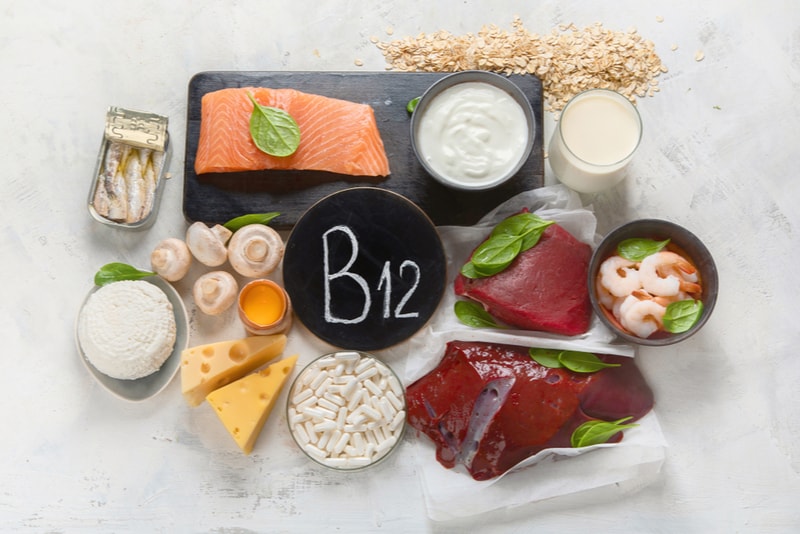
Vitamin-B12 is another water-soluble vitamin, just like Vitamin C, and it can’t be synthesized in the body.
That’s why our bodies need an outside source of Vitamin-B12.
This vitamin is essential for proper body functioning.
Here’s Why Vitamin B 12 Is Important!
Vitamin B 12 takes care of numerous body functions including formation of red blood cells, metabolism in the cells, multiple nerve functions, and DNS formation.
It’s also responsible for folic acid absorption in our bodies.
Why Is Vitamin-B12 So Important For Breastfeeding Women And Babies?
Vitamin-B12 is crucial for breastfeeding women.
Your breastmilk is the only source of Vitamin B 12 for your baby.
From their birth up to 6 months, babies need 0.4 mcg of Vitamin B 12.
Their Vitamin B 12 needs increase to 0.5 mcg from 7 to 12 months of age.
Do Pregnant Women Really Need Vitamin B 12 Supplements?
Not every pregnant woman or breastfeeding mom needs Vitamin B 12 supplements.
If you’re on a healthy and balanced diet, you probably don’t need supplements at all.
However, because vegans don’t consume any animal products, they are at risk of developing a Vitamin B 12 deficiency if they don’t take a Vitamin B 12 supplement.
If you’re a nursing mother and you need an extra dose of Vitamin B 12 to pack your milk supply with nutrients, you should consume foods rich in Vitamin B 12 and supplements like Emergen C or the prenatal vitamins that you used to take during your pregnancy.
Signs Of Vitamin B12 Defficiency
Below are the signs that you’re not taking in the daily recommended amount of Vitamin B12:
– Anemia
– Fatigue
– Weakness in the muscles
– Heart palpitations
– Shortness of breath
– Gastrointestinal issues
– Numbness or tingling sensation
– Sight problems and vision loss
– Depression
– Memory issues
– Behavioral problems
Not taking your daily value of Vitamin B 12 may lead to:
– Failure to thrive
– Movement disorders
– Developmental delays
– Megaloblastic anemia
Which Foods Are Rich In Vitamin B 12?
Vitamin B-12 is present in plant-based foods in very low quantities.
That’s why many vegans suffer from Vitamin B 12 deficiency if they’re not taking supplements.
The best sources of Vitamin B 12 are dairy and meat:
– Fish
– Shellfish
– Eggs
– Soy products
– Beef liver
– Sardines
– Mackerel
– Lamb
– Wild salmon
– Fortified nutritional yeast
– Feta cheese
– Soy products
– Rice beverages
For any additional information on Vitamin B 12, I suggest you check out dietary supplement facts online on the National Institute of Health website, Office of Dietary Supplements website, or US Department of Health and Human Services website.
Vitamin B1 In Emergen-C

Vitamin B1 is also known as thiamine. One serving of Emergen C while breastfeeding contains 0.3 mg of thiamine which will satisfy a mother and her baby’s needs.
The recommended daily amount is 1.4 mg, but you can’t go overboard with this vitamin as there’s no daily allowance for consumption.
Too much Vitamin B1 in the diet increases the levels of thiamine in breastmilk but, there are no known side effects of this, so you can safely consume Vitamin B1 and Emergen C while breastfeeding your little one.
Also, foods such as beef, pork, nuts, and whole grains have a healthy dose of this vitamin.
Vitamin B2 In Emergen C
Vitamin B2 is also known as riboflavin. One serving of Emergen C contains 0.43 mg of this vitamin, while the recommended amount is 1.6 mg.
The daily allowance is 50 mg and this shouldn’t be exceeded.
Meat and dairy products have lots of riboflavin. Such foods include eggs, green veggies, kidney, liver, and other organ meat.
However, high doses of riboflavin cause the urine to turn orange.
If you consume too much Emergen C while breastfeeding, it can lead to an increased amount of Vitamin B2 in breastmilk.
Vitamin B9 In Emergen C
Vitamin B9 or folic acid has a recommended daily allowance of 0.5 mg.
One serving of Emergen C has 0.100 mg. The highest limit for breastfeeding moms should be 1 mg a day.
Moms who breastfeed their babies should take folic acid only when they’re malnourished.
If they take too much folic acid, it won’t affect folic acid milk levels. Foods packed with folic acid are citrus fruits, whole grains, beans, and leafy greens.
Vitamin B6 In Emergen C
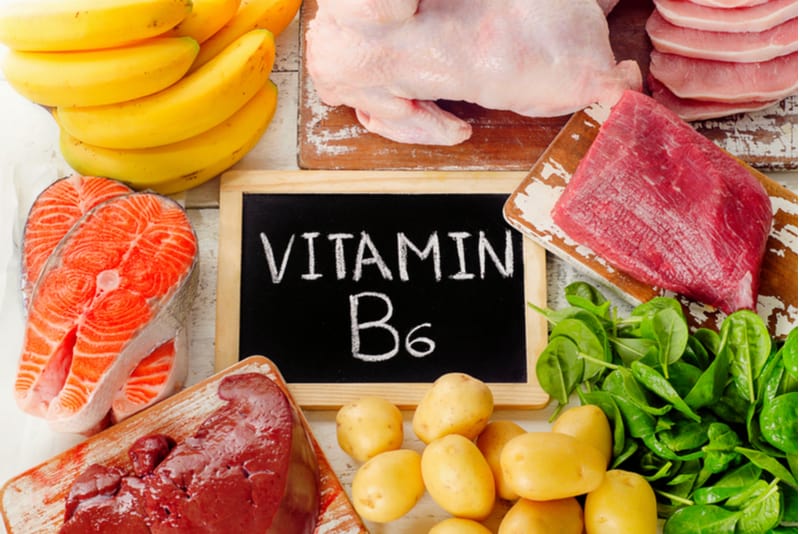
Foods such as poultry, whole grains, eggs, veggies, fish, and bread, have high doses of Vitamin B6.
However, if you consume too much of it, you may end up with nerve damage, elevated light sensitivity, nausea, irritated skin, and heartburn.
One pack of Emergen C has over 7 times the recommended dose of 1,3 mg.
Zinc In Emergen C
The recommended amount of zinc per day is 12 mg, while one serving of Emergen C contains 2 mg.
Moms who are vegetarians or vegans will need to take zinc supplements as their diets have low-zinc absorption.
Breastfeeding moms should take 40 mg of zinc every day. Anything more than that will cause appetite loss, vomiting, nausea, diarrhea, and headaches.
Emergen C while breastfeeding doesn’t affect the levels of zinc in breast milk. Foods rich in zinc include cashews, almonds, and red meat.
Selenium In Emergen C
Adults should take 50 mg of selenium every day.
Selenium is an excellent immune booster, perfect for moms who are struggling with frequent colds.
However, if you take too much selenium, you can cause health problems such as brittle teeth and nails, constant metallic taste, irritability, and nausea.
If you’re looking for natural sources of selenium, try consuming more chicken, beef, pork, and shellfish.
Is Emergen-C Safe & Helpful For All?
It’s scientifically proven that a mother’s intake of supplements has an impact on the nutrients in her breast milk.
However, this doesn’t mean you should just take supplements as you wish and cross your daily allowance.
You need to consult your health professional first.
If you believe your breastmilk is lacking in your baby’s nutritional needs and has low levels of Vitamin C, Vitamin B 12, Vitamin D, and Vitamin E, you should let your doctor know.
He’ll conduct some tests to evaluate the situation and prescribe dietary supplements for you like Emergen-C.
You and your baby will be taken care of.
FAQS
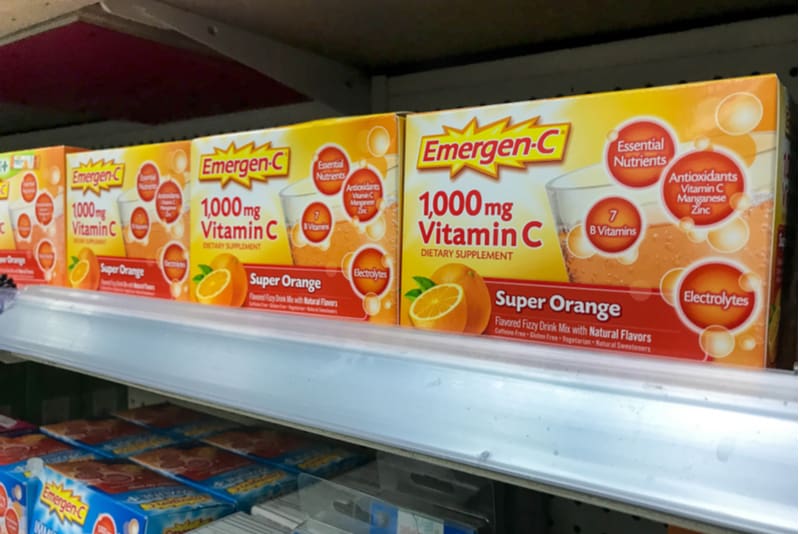
I may not have answers to all questions, but I do have answers to the most common ones concerning Emergen-C.
When It’s Not Safe To Take Emergen-C While Nursing
Very high quantities of Emergen-C and Vitamin-C can be harmful for babies since significantly high doses increase the risk of kidney stones.
Also, if you’re a lactating mom with kidney issues, you should be careful when taking Vitamin C supplements like Emergen-C.
Does Vitamin C Reduce Mastitis?
Experts claim Vitamin C prevents and cures mastitis in lactating moms.
Mastitis is caused by infection, and Vitamin C is there to enhance immune function and fight infections.
Does Freezing Breastmilk Affect Vitamin C?
Many moms nowadays pump and freeze breastmilk for when they’re not around.
This is extremely helpful for both moms, babies, and their caretakers.
But, do all the nutrients in the breastmilk stay the same after freezing?
Yes, they do, but only if you store them properly.
If you store pumped breastmilk in the fridge for 24 hours, the amount of Vitamin C will drop down by a third.
If you save the milk in the freezer for up to a month, the amount of Vitamin C will be reduced by two thirds.
Don’t over pump and store way more milk than your baby needs. If you’re overproducing, consider donating to babies in need.
To Sum Up…
Emergen C while breastfeeding can be used according to the daily recommended amount.
Nothing is good if used too often or excessively. All of the Emergen C products are a good boost of Vitamin C when needed.
Many expecting women and breastfeeding moms experience colds, poor immunity, and fevers in the postpartum period.
They need something that’ll work efficiently and fast. But, they also need something safe for them and their babies.
Emergen C is the answer!
You can absolutely rely on Emergen C while breastfeeding, however, it shouldn’t replace a balanced diet rich in vitamins.
Too many vitamin supplements may lead to vitamin overdose, which is not healthy at all.
Contact your healthcare provider if you’re considering taking Emergen C as your emergency.
Like this post? Please share or pin it for later. You can also stay in the loop and follow us on Facebook, Instagram or Pinterest.
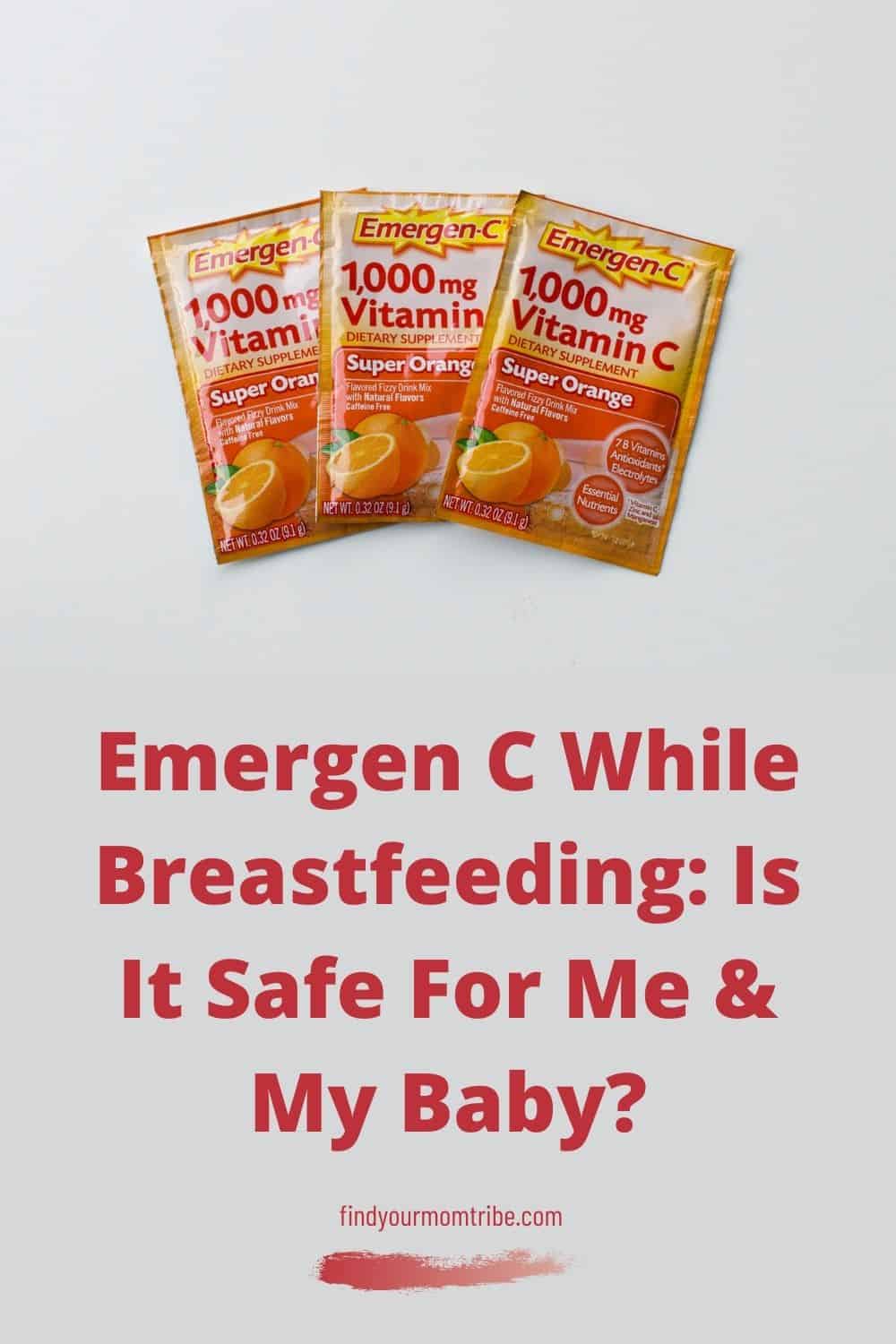
We love honesty! Find Your Mom Tribe is an Amazon Associate and we earn from qualifying purchases through affiliate links at no extra cost to you. Please see our full Amazon Affiliate disclosure for more information.

